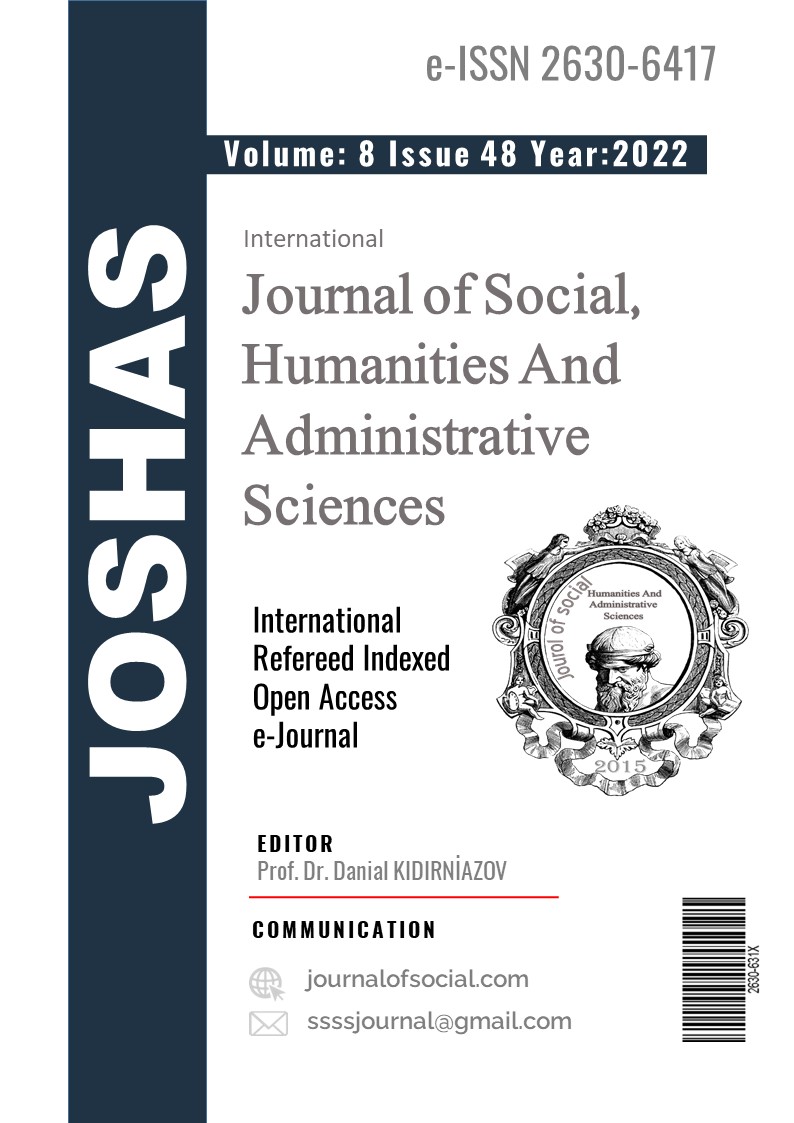Author :
Abstract
Osmanlı Devleti’nin siyasal ve toplumsal kurumlarının “erkek egemen” (patriarkal) bir yapıyla var olduğu yapılan sosyal bilim ve özellikle toplumsal cinsiyet çalışmalarında artık bir ön kabul olarak tanımlanmıştır. Bu toplumda kadınların varlığı yeni bir devlet mekanizması, yeni bir üretim-tüketim ilişkisi, yeni bir toplum, yeni bir aile ve dolayısıyla yeni bir edebiyat kamusunun inşâ edildiği XIX yüzyılın ikinci yarısına doğru artık başka bir boyutta değerlendirilmek durumundadır. İşte bu çalışmada, erken modern Osmanlı toplumunda kadın yazarların, erkek yazarlar yanında kendilerini, kendi seslerini var etme, başka bir deyişle kendi dillerini oluşturma çabalarının hangi toplumsal ve kurumsal dinamiklerle sınırlandığı veya desteklendiği, feminist edebiyat eleştirisi kuramlarının da yardımıyla incelenecektir. Makalede modern Türk edebiyatının önemli isimlerinden Ahmet Mithat Efendi’nin Osmanlı edebiyat ortamında “kadın sorunu” üzerine tartışılan düşüncelerinin “erkek söylem” içerisinde nasıl yer aldığı, buna karşılık Şair Fıtnat Hanım, Şair Nigâr ve Fatma Âliye Hanımların bu söylem içerisinde nasıl bir üslûp ve dil ile “varolma”ya çalıştığı örneklerle açıklanacaktır.
Keywords
Abstract
The view that the political and social institutions of the Ottoman Empire have a "male-dominated" (patriarchal) structure has now been defined as a pre-acceptance in social sciences and especially in gender studies. However, the socio-political existence of women in the second half of the 19th century has to be re-evaluated, especially considering the fact that in this era a new state mechanism, a new production-consumption relationship, a new society, a new family, and therefore a new literary public were built. This study, therefore, will examine, with the help of feminist literary criticism theories, which social and institutional dynamics limited or supported the efforts of women writers to create their own voices; in other words, to create their own language alongside male writers in early modern Ottoman society. The article will discuss how the ideas of Ahmet Mithat Efendi, one of the important names of early modern Turkish literature, concerning the "women's problem" in the Ottoman literary environment, have located themselves within the "male discourse", yet on the other hand, how the poets Fıtnat Hanım, Nigâr and Fatma Âliye Hanım had struggled to “exist” in this discourse through a new style and language by this discussing several relevant literary samples.
Keywords
- Ahmet Mithat Efendi. “Felsefe-i Zenân”. Letaif-i Rivayat. yay. haz. Fazıl Gökçek, Sabahattin Çağın. İstanbul: Çağrı Yayınları, 2001. 56-86.
- Ahmed Midhat Efendi. Fazıl ve Feylesof Kızım: Fatma Aliye’ye Mektuplar. haz. F. Samime İnceoğlu, Zeynep Süslü Berktaş. İstanbul: Klasik Yayınları, 2011.
- Bekiroğlu, Nazan. Şâir Nigâr Hanım. İstanbul: İletişim Yayınları, 1998.
- Berktay, Fatmagül. “Osmanlı’dan Cumhuriyet’e Feminizm”. Tarihin Cinsiyeti. İstanbul: Metis Yayınları, 2003. 88-111.
- Çakır, Serpil. Osmanlı Kadın Hareketi. İstanbul: Metis Yayınları, 1996.
- Fatma Aliye. Hayattan Sahneler (Levâyih-i Hayât). çev. yay. haz. Tülay Gençtürk Demircioğlu. İstanbul: Boğaziçi Üniversitesi Yayınları, 2002.
- Güneş, Aslı. “Üç İstanbul: Edebi Patriark ile Toplumsal Patriarkın Paslaşmaları”. Parşömen 2 (Bahar 2003): 1-16.
- Gürbilek, Nurdan. “Erkek Yazar Kadın Okur”. Kadınlar Dile Düşünce, Edebiyat ve Toplumsal Cinsiyet. der. Sibel Irzık, Jale Parla. İstanbul: İletişim Yayınları, 2004. 275-305.
- Humm, Maggie. Feminist Edebiyat Eleştirisi. yay. haz. Gönül Bakay. çev. Özge Altay ve diğer. İstanbul: Say Yayınları, 2002.
- Irzık, Sibel. “Öznenin Vefatından Sonra Kadın Olarak Okumak”. Toplum ve Bilim 75 (Kış 1997): 33-48.
- Kandiyoti, Deniz. “Ataerkil Örüntüler: Türk Toplumunda Erkek Egemenliğinin Çözümlemesine Yönelik Notlar”. Cariyeler Bacılar Yurttaşlar. çev. Aksu Bora ve diğer. İstanbul: Metis Yayınları, 1997. 167-80.
- Kızıltan, Mübeccel. Fatma Aliye Hanım: Yaşamı-Sanatı-Yapıtları ve Nisvan-ı İslam. İstanbul: Mutlu Yayıncılık, 1993.
- Koç, Hüsniye. “Hanımlara Mahsus Gazete’deki Hikâyeler ve Temaşa Fikri”. Türk Dili ve Edebiyatı Dergisi. C. 59 (2, 2019): 333-361.
- Mardin, Şerif. “Tanzimat’tan Sonra Aşırı Batılılaşma”. Türk Modernleşmesi. İstanbul: İletişim Yayınları, 1995. 21- 79.
- Moran, Berna. Türk Romanına Eleştirel Bir Bakış. İstanbul: İletişim Yayınları, 1994. 1. cilt.
- Okay, Orhan. Batı Medeniyeti Karşısında Ahmet Midhat Efendi. İstanbul: Millî Eğitim Gençlik ve Spor Bakanlığı Yayınları, 1989.
- Oktay, Gülçin. “Türk Romanında Kadın ve Toplumsal Cinsiyet: Kimlik, Sınıf, Temsil (Kadın Yazarlar Örneğinde,1877-1938)”. Doktora Tezi, Çanakkale Onsekiz Mart Üniversitesi, Sosyal Bilimler Enstitüsü, Türk Dili ve Edebiyatı Bölümü, 2018.
- Parla, Jale. “Kadın Eleştirisi Neyi Gerçekleştirdi”. Defter 21 (Bahar 1994): 99-113.
- Toska, Zehra ve diğer. İstanbul Kütüphanelerindeki Eski Harfli Türkçe Kadın Dergileri Bibliyografyası. İstanbul: Metis Yayınları, 1993.
- Türkmen, Buket. “Toplumsal Proje ve Kadınlık Deneyimi: İslamcı Kadın Tarafından Yeniden Tanımlanan Mahrem”.Cinsiyetli Olmak. Sosyal Bilimlere Feminist Bakışlar. derleyen Zeynep Direk. İstanbul: Yapı Kredi Yayınları, 2005: 130-156.
- Yaraman, Ayşegül. Resmi Tarihten Kadın Tarihine. İstanbul: Bağlam Yayınları, 2001.Yavuz, Hilmi. Kendime, İstanbul’a, Kadınlara Dair. İstanbul: Boyut Kitapları, 1997. Zihnioğlu, Yaprak. Kadınsız İnkılap. İstanbul: Metis Yayınları, 2019.





